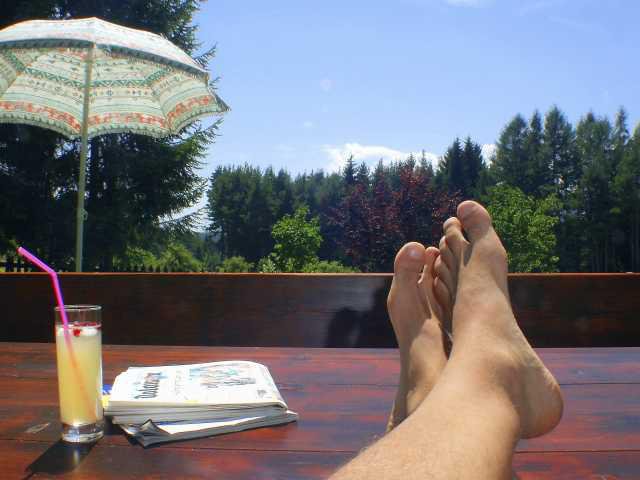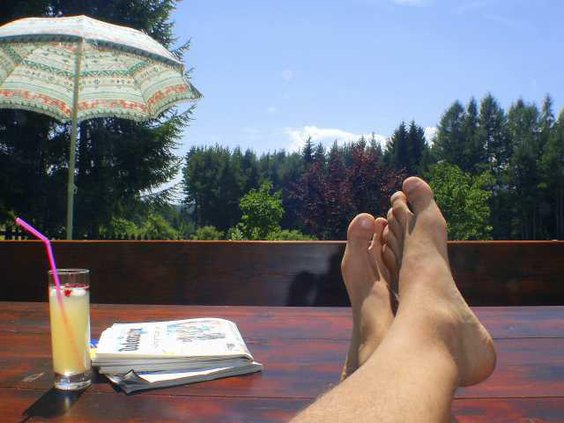Vacation is today’s big bad wolf for Americans.
That’s right. Americans are frightened of taking time off work for vacation. A survey by the U.S. Travel Association found that four out of 10 Americans aren’t going to take all of their vacation days. Why? Because they’re not exactly enthusiastic about the work they’ll find on their desk when they return, the survey found.
“They dread the pile of work awaiting them when they return, and no one else can do what they do at the office,” according to the survey. “These people suffer from what the researchers called a ‘martyr’ complex, believing that they’re the only ones who can do their jobs.”
It’s not just fear, though. Americans are taking less vacations overall, according to the Bureau of Labor Statistics. The data showed that more than 9 million people took a vacation in July 1976, but now that number is closer to 7 million for 2014. In fact, a 2012 survey by Harris Interactive Inc. found Americans leave 9.2 days of vacation unused.
Still, companies are encouraging their workers to take time off. Some have said that this is a bad idea and that there needs to be more balance between work and life instead of just vacation time.
But vacation days are something many Americans have and, in some cases, are willing to use.
Here are seven ways vacation can be beneficial for you:
Better physical health
The New York Times reported that a vacation can help your physical health — the stress of working can take a serious toll on your heart. For both men and women, taking a vacation every two years compared to every six will lessen the risk of coronary heart disease or heart attacks, The Times reported.
"It shows how the body reacts to a lifestyle of stress," said Elaine Eaker, author of a study by the Framingham Heart Study, to The Times. "This is real evidence that vacations are important to your physical health."
More productivity
Count on being more productive if you’re taking vacations. Upon returning from vacation, workers are likely to put more emphasis on the work they have to make up, according to The New York Times. Research says that a lot of that has to do with the way humans are made.
“The importance of restoration is rooted in our physiology. Human beings aren’t designed to expend energy continuously,” The Times reported. “Rather, we’re meant to pulse between spending and recovering energy.”
Closer family relationships
Psychology expert Susan Krauss Whitbourne said one of the biggest benefits of taking vacation is how much it affects familial relationships. Family vacations increase family bonding, especially when a lot of the activities have to do with talking about memories or even sharing stressful moments together.
“Shared family memories and time spent together isolated from ordinary everyday activities (school, work and so on) help to promote these positive ties,” Whitbourne wrote. “Though family vacations can have their own share of stress, the benefits outweigh the risks, even in families that are not particularly close.”
Newer perspectives
Step away from work for awhile and enjoy the summer sun. When you come back to work, you’ll have a totally new outlook on life. CNN reported that when you step away from the problems and stresses you’re facing, you’re bound to get a better perspective and come out with a more satisfying answer. An example of this, according to CNN, would be when you ask your friend for advice on a situation. The friend is removed from the scenario, and thus can offer advice more easily.
Increased mental power
Working all the time and getting things done might make you think you’re the king of the world. But your brain is feeling something completely different. Research by the University of California Irvine’s Gregory Hickok found that our brains don’t have a reserve pool to gather energy and power from. Vacations can help reset your mind.
“If we had a huge amount of brain power in reserve, we might not need vacations,” the Tribune reported. “We could just tap those beach-lolling brain cells. But we don't. Time off tunes up a well-functioning brain.”
Lower chance of burn out
Starting to feel a little burned out? Guess that’s a perfect reason to take a vacation — especially because the time away will actually keep you from letting the fire inside of you die. According to about.com, one of the key benefits of taking time off work is that you won’t feel all the pressures and discouragement that arise once you begin showing symptoms of a burnout.
“Workers who take regular time to relax are less likely to experience burnout, making them more creative and productive than their overworked, under-rested counterparts,” according to about.com.
Improved mental health
U.S. News and World report spoke to experts who noted that one of the main benefits of vacation time is that it can improve your mental health. Feelings of calm arise and relieve the stress, which allow the body and mind to heal in ways that it couldn’t if it were still under pressure.
Email: hscribner@deseretdigital.com
Twitter: @herbscribner








